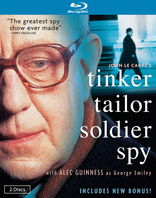Tinker Tailor Soldier Spy Blu-ray Movie
HomeTinker Tailor Soldier Spy Blu-ray Movie 
Acorn Media | 1979 | 324 min | Not rated | Apr 24, 2012Movie rating
8 | / 10 |
Blu-ray rating
| Users | 4.0 | |
| Reviewer | 3.5 | |
| Overall | 3.5 |
Overview
Tinker Tailor Soldier Spy (1979)
Retired agent George Smiley is secretly brought into ‘the Circus’ (the code name for British Secret Intelligence Service) to root out a top-level mole. Gradually piecing together the story, the weary but determined Smiley trawls through the murky waters of Cold War espionage and his own past.
Starring: Alec Guinness, Michael Jayston, Anthony Bate, George Sewell, Ian RichardsonDirector: John Irvin
| Drama | Uncertain |
| Thriller | Uncertain |
Specifications
Video
Video codec: MPEG-4 AVC
Video resolution: 1080i
Aspect ratio: 1.38:1
Original aspect ratio: 1.33:1
Audio
English: Dolby Digital 2.0
Subtitles
English SDH
Discs
50GB Blu-ray Disc
Two-disc set (2 BDs)
Packaging
Slipcover in original pressing
Playback
Region free
Review
Rating summary
| Movie | 4.5 | |
| Video | 1.5 | |
| Audio | 3.0 | |
| Extras | 4.0 | |
| Overall | 3.5 |
Tinker Tailor Soldier Spy Blu-ray Movie Review
High Stakes Mind Games
Reviewed by Michael Reuben April 18, 2012Consciously or not, we expect spy tales to be action stories. Master spies from James Bond to Jack Bauer, Ethan Hunt, Sydney Bristow and Evelyn Salt have accustomed audiences to thinking of covert operatives as men and women of action. In the real world, though, most people in the espionage game spend their time gathering and analyzing information, and we've all seen recent examples of the serious consequences when they don't get it right. Today most covert intelligence is assembled from electronic surveillance and monitoring the internet and global communications, but during the Cold War it had to be gathered the old-fashioned way, through human contact—and this required specialists in manipulation and deception. Every so often, a film grapples with the challenging task of dramatizing this cerebral form of combat, and a few have done so successfully. Notable examples are The Ipcress File (1965), The Quiller Memorandum (1966) and The Russia House (1990). Novels are better suited to this sort of thing, and John le Carré is one of the best at writing them. But le Carré's books have long been a challenge for screen adapters, many of whom have failed miserably (e.g., George Roy Hill's 1984 adaptation of The Little Drummer Girl, where Diane Keaton gave one of her worst performances). Even when they succeed, as with Tomas Alfredson's recent screen version of Tinker Tailor Soldier Spy starring Gary Oldman as George Smiley, contemporary audience members are often bored by the result. They just can't get excited by a film in which the most sustained sequence of suspense involves a man surreptitiously looking through a file. As le Carré is reported to have said, he writes about "a mostly aging, weary, unromantic lot, prone to distressing stomach ailments and having troubles with their wives". Superheroes they ain't. Anyone who found Alfredson's film dull will be driven to distraction by John Irvin's six-hour TV version of the same story, which was hugely successful when it was shown on the BBC in England in 1979 and on PBS in America in 1980. Irvin's miniseries starred the late Alec Guinness as George Smiley in an entirely different portrayal than the memorable cipher created by Oldman. Irvin's version also had the time to explore side roads and subplots that Alfredson's film had to omit or cut short. Just as an example, in Irvin's version we actually get to meet the Soviet spymaster known as "Karla", the puppeteer pulling everyone's strings from Moscow. And if that isn't enough to whet your appetite, Karla is played by a young Patrick Stewart, years before he uttered the phrase "Make it so!" on the bridge of the Starship Enterprise.

If you've recently watched Alfredson's film, then you'll already have a grasp of the basic plot of Tinker Tailor, but the miniseries adds more layers and shifts various emphases. Also, the central character of George Smiley as portrayed by Alec Guinness (in his first TV appearance) makes a far different (though equally strong) impression than the version of Smiley offered by Gary Oldman—which only serves to underline the magnitude of Oldman's achievement, because, for an entire generation, including author le Carré, Guinness was Smiley. In 1973, the eyes of Western intelligence remain firmly fixed on the Soviet Union. In Britain, this task falls to the British Intelligence Service, informally known as "the Circus", which is headed by an officer so secretive that he is known only as "Control" (Alexander Knox). But as in many organizations, a power struggle is in progress to take the reins from the aging Control. A group of young Turks led by Percy Alleline (Michael Aldridge) has developed a highly placed Soviet source code-named "Merlin", who they believe is their ticket to running the Circus. Control has his doubts. In this particular business, you do look a gift horse in the mouth. In fact, Merlin is a carefully managed plant created by the Circus' adversary in Moscow, known only as Karla (Stewart). The Merlin operation, dubbed "Witchcraft" by the Circus, is an elaborate cover for a highly placed mole in British intelligence, who is either Alleline or one of his group: Bill Haydon (Ian Richardson), Roy Bland (Terence Rigby) or Toby Esterhase (Bernard Hepton). An agent in the field in Lisbon, Ricki Tarr (Hywel Bennett), picks up rumors of the mole but not his identity. When Tarr reports through the usual channels, strange things happen and he immediately goes underground. Now, all of the information above comes out in dribs and drabs over the course of six hours. Consistent with le Carré's twisty and indirect narrative style, the adaptation by Arthur Hopcraft begins in midstride with Control dispatching a trusted agent, Jim Prideaux (Ian Bannen), to a meeting in Czechoslovakia with a general who is supposed to know the identity of the mole. Control instructs Prideaux to report back one word identifying the traitor: "Tinker" for Alleline; "Tailor" for Haydon; "Soldier" for Bland; "Poorman" for Esterhase; or "Beggarman" for Control's right-hand assistant, George Smiley (Guinness), who must also be considered suspect because of his senior position. But the meeting is a setup. Prideaux is ambushed, shot and captured. Control takes the blame for the debacle and is forced out of the service, along with Smiley. All reference to "Tinker Tailor" disappears with Control, who has been in failing health and dies shortly after his disgrace. Alleline takes over as head of the Circus. A year later, Ricki Tarr surfaces and contacts Peter Guillam (Michael Jayston), a former insider at the Circus who is now head of what they call "the scalp-hunters"(Circus slang for a specialized group of field agents who handle high-risk jobs), with the report he originally sent about a mole. Guillam, in turn, contacts Sir Oliver Lacon (Anthony Bate) of the Home Office. Skeptical but concerned, Lacon asks Smiley to reopen Control's investigation in secret, with Guillam's assistance. Smiley's inquiry, with all its twists, detours, flashbacks and feints, is the golden thread that runs through the rest of the story. Broadly speaking, there are two major differences between this 1979 miniseries and Alfredson's 2011 film. The first, obviously, is a matter of length. The miniseries had the time to explore avenues and flesh out narrative elements that had to be trimmed or eliminated for the film. Smiley's recollection (as told to Guillam) of his meeting with Karla many years earlier is a prominent example. Another is the aftermath of the mole's exposure, which occupies almost half an hour in the miniseries and includes a fascinating conversation between Smiley and the mole concerning the whys and wherefores of the mole's betrayal. Even Prideaux's unsuccessful adventure for Control (dubbed "Operation Testify") is played out at greater length and, as a result, more credibly, along with the aftermath in the London office, when reports come back that the operation has gone awry. The second major difference from Alfredson's film is a matter of style. Perhaps because it was shot at real locations in roughly the same era depicted in le Carré's novel, the miniseries captures an authentic look and feel that the film seemed to take pains to smooth over. The spies in a le Carré story are frumpy civil servants who don't make much money, rarely dress well, labor in ugly, cramped offices, drive old cars and dine at reasonably priced restaurants serving dull English cuisine. The miniseries gets this exactly right, while the film surrounds its characters with flat, somber tones, flattering illumination and wide, open spaces that cleans them up for the silver screen. They still look and act like corporate drones, but as a group, they're a little too distinguished, and the environments they inhabit are too big and too well maintained. (Just compare the size and the gloss of the two conference rooms where first Control and then Alleline meets with his lieutenants.) The difference in style is also reflected in the different interpretations of the lead character by Alec Guinness and Gary Oldman. The film's spiffier decor put all the burden on Oldman's Smiley to convey the pinched severity of the dyspeptic spies who inhabit le Carré's world, and Oldman rose to the challenge with a performance that made Smiley's name ironic—his expressionless face never cracked a smile. Guinness' Smiley could indulge in a wider range of expression, because he was operating in an environment that was just as shabby and worn as Smiley is himself. (There are many more references to his failed marriage, which, with perfect British politeness, everyone treats as if it were normal, thereby only further emphasizing the failure.) Guinness' Smiley smiles frequently, but the most notable element of his smile is that it's like every other expression on his face: empty. Years of practice—and, of course, being British—have emptied Smiley's countenance of every discernible trace of emotion. No matter what expression he puts on, his face remains a mask.
Tinker Tailor Soldier Spy Blu-ray Movie, Video Quality 
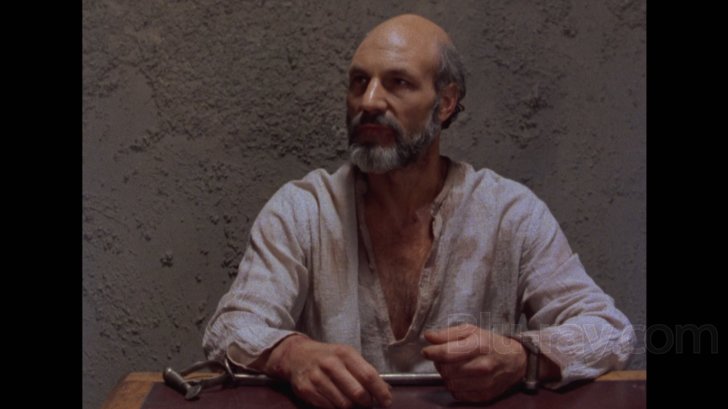
When Brideshead Revisited was shot entirely on 16mm film in 1980-1981, it was considered a revolution for British TV. However, Tinker Tailor had already done the same thing in 1979. Unfortunately for Blu-ray fans, the elements available for this 1080i, AVC-encoded Blu-ray of Tinker Tailor have not been well-preserved, and they have not been given a restoration for this release. I don't know whether the source was a camera negative, an interpositive or a print, but it's in poor shape. Scratches, dirt, white blotches and "wobbles" abound. The resolution extracted from the source is disappointingly poor. One expects a certain degree of graininess from 16mm sources, especially from this era (film stocks had not yet progressed to the quality on display ten years later, when the Poirot series began filming), but the image on Tinker Tailor is not only grainy, but also fuzzy and indistinct. Indeed, if one compares the image from the 1080i feature to the same image from an overlapping portion in one of the deleted scenes, which are presented in 480i, it is difficult to see any meaningful increase in detail between the two. Black levels are fair at best, so that shadow detail in night scenes is largely non-existent. Colors are generally muted, although this may be intentional, given the fact that the production was created for standard-definition TV in an age before home video. All in all, it appears that Acorn Media, which doesn't do transfers or restorations, has done a respectable job authoring and encoding what it was given. The problem is that Acorn was given an unimpressive transfer from a poor source.
Tinker Tailor Soldier Spy Blu-ray Movie, Audio Quality 
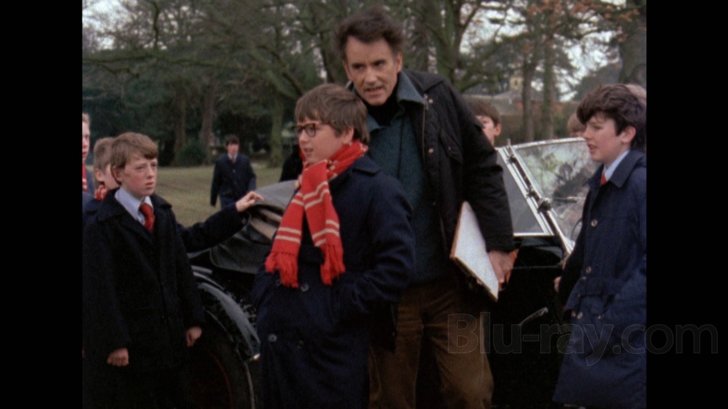
The news is somewhat better on the audio front. Tinker Tailor's original mono soundtrack has been encoded as DD 2.0 at 256 kbps. While the format isn't lossless, the higher bitrate provides superior fidelity to what usually appears on DVD and seems sufficient for the track's limited dynamic range. (Again, it should be noted that the show was designed for the limits of broadcast TV in 1979.) Dialogue is clearly rendered. The distinctive score by Geoffrey Burgon, who would shortly become famous for his Brideshead Revisited soundtrack, hits the high notes without shrillness and has limited bass extension. It's an impressive and effective score, with its dirge-like theme and its ability, at key moments, to suggest an underlying sense of urgency.
Tinker Tailor Soldier Spy Blu-ray Movie, Special Features and Extras 
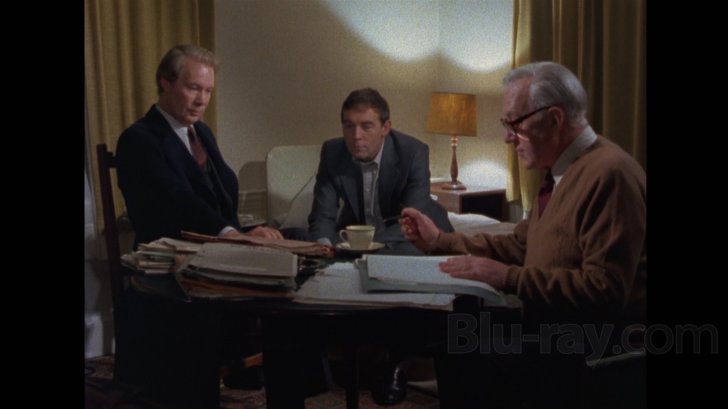
- John Irvin Interview (HD, 1080i; 1.78:1; 29:56): In person as on film, Irvin is a quiet storyteller but an effective one. His tales of working with Alec Guinness (a collaboration that didn't always run smoothly) are vivid and memorable. Guinness would later write that he enjoyed having someone "with balls" behind the camera. Irvin also describes his own background as a filmmaker and the origins of Tinker Tailor as a BBC project.
- John le Carré Interview (SD, 480i; 1.78:1, non-enhanced; 19:33): Interviewed on March 8, 2002, when he was 70, the author reflects on his work generally, on the novels that featured George Smiley and on his work with Alec Guinness in adapting Smiley's People (the sequel to Tinker Tailor) for television. It's a thoughtful, insightful interview, free of vanity or illusion.
- Deleted/Missing Scenes (SD, 480i; 1.33:1; 11.26): There are 12 scenes, many of which are extensions of scenes that remain in the version as presented. Pre-release speculation suggested that these might constitute the seventh chapter from the original British broadcast, but someone with access to a copy of the British version will have to be the judge. The American version was re-edited and rearranged into six chapters, but according to IMDb, that version ran 290 minutes, as compared to the original 315 (which would make each of the seven chapters 45 minutes long). This version released by Acorn runs 324 minutes, with titles and recaps (I checked).
- Production Notes: Three pages of informative text on the production. The information came primarily from producer John Powell.
- John le Carré Biography: A brief overview and a list of published novels.
- Additional Trailer: At startup, disc 1 plays a trailer for Acorn Media, which can be skipped with the chapter forward button and is not otherwise available once the disc loads.
- Insert: A four-page booklet with a glossary of terms, a list of key characters and a cast list that's far superior to the one available at IMDb.
Tinker Tailor Soldier Spy Blu-ray Movie, Overall Score and Recommendation 
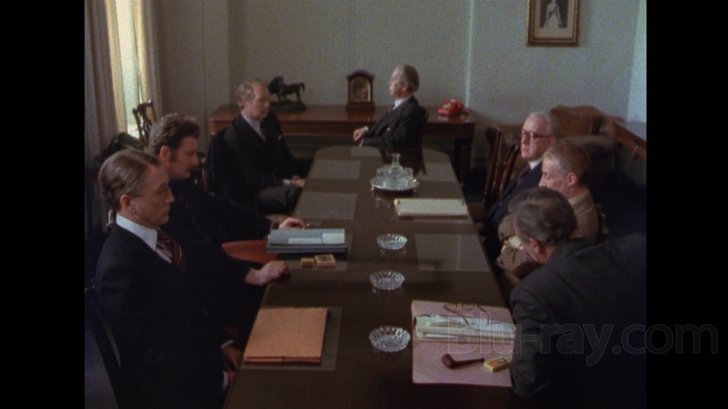
I know that fans of the original Tinker Tailor have been hoping for a makeover commensurate with the Blu-ray restoration of The Prisoner, and I wish I could report that this is what they're getting, but it isn't. If you already have the DVD set, then I can't in good conscience recommend an upgrade; indeed, before releasing this review, I asked Acorn to send me the DVDs for comparison, and I could not see a meaningful difference. If you've been holding out for the Blu-ray discs, then by all means get those, because they include the interview with director John Irvin and the image is occasionally a hair's breadth better. Given the fact that it took Acorn Media years to clear the rights to Tinker Tailor, it's unlikely that a better version will arrive anytime soon.
Similar titles
Similar titles you might also like

Smiley's People
1982

Child 44
2014

Tinker Tailor Soldier Spy 4K
2011

The Good Shepherd
2006

The Americans: The Complete First Season
2013

The Spy Who Came in from the Cold
1965

Shadow Dancer
2012

Funeral in Berlin
1966

Man on a String
Ten Years a Counterspy
1960

The Manchurian Candidate
1962

Marnie 4K
1964

Spinning Man
2018

Billion Dollar Brain
1967

Under Suspicion
1991

The Serpent's Egg
Special Edition
1977

A Most Wanted Man
2014

The Quiller Memorandum
Limited Edition to 3000
1966

Fail Safe
1964

Kiss Me Deadly
1955

Carlos
Uncut Version
2010
